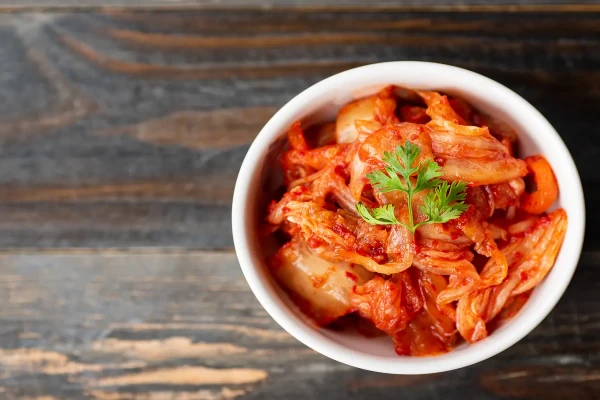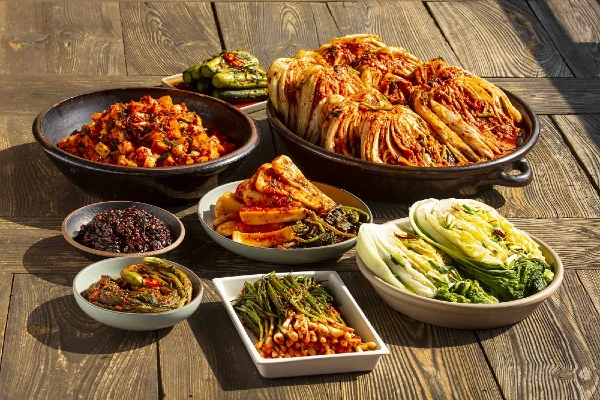Kimchi benefits, storage method, calories, nutrients
Kimchi Nutrition

| Kimchi (100g) Nutrition | |||
| Carbohydrate | Protein | Fat | Calories |
| 6g | 1.8g | 0.2g | 31kcal |
| Main Nutrition | Allicin, saponin, prebiotics, dietary fiber | ||
| Main Benefits | Anti-cancer effect, diet, immunity enhancement, cholesterol improvement | ||
| Side Effects | It is high in sodium, so excessive intake can cause heartburn and increase blood pressure. | ||
Kimchi is a traditional fermented food unique to Korea. It is made by using various vegetables such as cabbage, radish, and chives, pickled in salt, mixed with seasoning, fermented, and then eaten. This is a food made to allow people to consume the vitamins and nutrients contained in vegetables during the winter when vegetable production was difficult in the past. Therefore, kimchi is rich in vitamins, and the auxiliary ingredients in the seasoning also contain various nutrients, so it is treated as a health food that is helpful to the human body. People in other countries have the perception that kimchi is red and spicy, but there are many types of kimchi, including non-spicy kimchi such as white kimchi, and kimchi made with various ingredients.
Kimchi Benefits

1. Weight management
The main ingredients of kimchi are vegetables, and many vegetables such as cabbage and green onions are low in calories. Additionally, it is rich in dietary fiber, which helps people manage their weight. In addition, the peppers used in most kimchi contain capsaicin, which helps people control their weight by activating the body’s metabolism and burning fat.
2. Anti-cancer activity
Garlic, ginger, and radish that go into kimchi are known as superfoods that are very rich in antioxidants. It can prevent stomach cancer, liver cancer, and lung cancer, and can also suppress and kill cancer cells. Additionally, antioxidants become more abundant as they ferment, making them excellent for preventing various cancers.
3. Improved digestive function and intestinal health
Kimchi is a presentation food. During the fermentation process of kimchi, lactic acid bacteria are produced. Lactic acid bacteria help the growth of microorganisms that contribute to intestinal health and suppress the growth and activity of harmful bacteria that have negative effects. As a result, consuming kimchi is effective in preventing intestinal diseases such as constipation, and further helps prevent colon cancer. It also helps digestion and cleanses the intestines, improving digestive function and improving intestinal health.
4. Cholesterol management
Consuming an appropriate amount of kimchi on a regular basis helps increase cholesterol levels, which helps maintain blood vessel health. Additionally, the dietary fiber of the various vegetables in kimchi and the lactic acid bacteria produced during ripening are also effective in lowering bad cholesterol levels. Additionally, the garlic used in kimchi is rich in an ingredient called allicin. Allicin also helps lower cholesterol levels and is effective in preventing and preventing various diseases caused by elevated cholesterol.
5. Enhancement of immunity
As kimchi is fermented, its vitamin C content increases. This ingredient helps boost immunity. And probiotics, one of the lactic acid bacteria in kimchi, are also effective in improving immunity. Ingredients such as green onions, garlic, and raw lettuce that go into kimchi are rich in antioxidant vitamins and flavonoids. These ingredients play a very important role in the immune system and are effective in boosting immunity by helping to fight various infections.
Storage Method
It is recommended to store kimchi in an airtight container lined with kimchi plastic. If you put it in a kimchi plastic bag, you can slow down fermentation by reducing the area in contact with air. Cut cabbage can be stored with the root facing up. Also, in order to maintain the taste of kimchi, it is recommended to fill the kimchi container to only 60% of capacity and store it with the air removed.
Side Effect
- Since kimchi contains a lot of salt, caution should be exercised as excessive consumption can have a negative effect on people suffering from diseases such as high blood pressure.
- Excessive consumption of kimchi alone can cause diarrhea and heartburn, so it is recommended to eat it with rice.
- Kimchi contains histamine, so people with histamine syndrome should be careful because excessive consumption of kimchi can cause an allergic reaction.
References
🔹News-Medical: What are the effects of kimchi on human health?
🔹MedicalNewsToday: Kimchi: Benefits, nutrition, and risks
🔹ZOE: Kimchi: What Is It and What Are the Health Benefits?